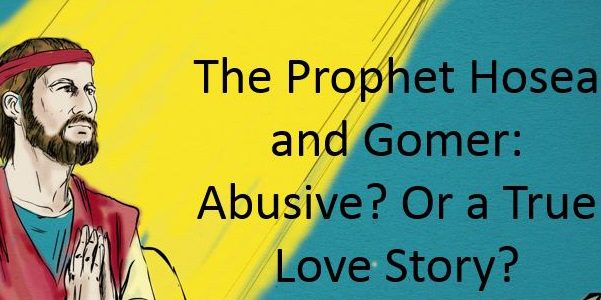 Hosea is probably best known in Christian circles for the phrase God “desires steadfast love and not sacrifice.” Jesus quotes that verse from Hosea twice in the Gospel of Matthew. Love, not sacrifice was a vital lens for Jesus.
Hosea is probably best known in Christian circles for the phrase God “desires steadfast love and not sacrifice.” Jesus quotes that verse from Hosea twice in the Gospel of Matthew. Love, not sacrifice was a vital lens for Jesus.
(For more in the Bible Matters series, click here.)
But Hosea’s book does not always reflect that verse. Understandably, it often reflects the violence and horror of Hosea’s time.
Political Chaos
Hosea lived during one of the worst periods of Israel’s history. His ministry began in the 8th century BC under king Jeroboam the Second. Jeroboam had a prosperous and peaceful reign of about 40 years. After his death, Israel had 5 kings in 10 years. Three of those kings assumed the throne through violent assassinations. Hosea and Israel experienced political chaos.
But chaos within Israel was mirrored by chaos outside of Israel. The Assyrian Empire expanded its territory through war. The Assyrian Emperor, Tiglath-pileser III, himself came to power by assassinating the Assyrian Royal Family. He is honored still today as one of the most successful military rulers of all time, in part because of his horrific strategies. He slaughtered the people he conquered and impaled their bodies on stakes near conquered cities to display his power before his victims.
But he also implemented mass slavery and deportation of the nations he conquered. He exiled people from one nation to another, in order to foster confusion and despair among the people. This caused them to lose hope in any kind of rebellion.
Under Sargon the Second, the Assyrian Empire conquered Israel in the year 722 BC. The big question for Israel and Hosea during this time was “How could this happen to us?”
How Could this Happen to Us?
In many ways, Hosea’s answer was just like the other Hebrew prophets. He said we messed up. The prophets generally resist blaming other nations like the Assyrian, Babylonian, and Egyptian Empires. They say that we can’t scapegoat others, we need to take responsibility to make our nation, neighborhoods, and families better.
Hosea’s main issue is that the people fell into idolatry. They worshipped other gods and Hosea claims that Israel played the whore and committed themselves to whoredom with idolatry. We’ll come back to this metaphor in a minute.
But the problem of idolatry led to more problems. In chapter 4, Hosea states, “There is no faithfulness or loyalty, and no knowledge of God in the land. Swearing, lying, and murder, and stealing and adultery break out; bloodshed follows bloodshed.”
A Mimetic Crisis
Israel was experiencing what Rene Girard calls a mimetic crisis that led to “bloodshed following bloodshed.” Violence was supreme and everyone imitated their neighbor’s violence. Hosea tells us that the true God of Israel desired steadfast love, but the people who worshipped idols only desired a cycle of violent sacrifice.
More than any other prophet, Hosea claims that this reciprocal violence grieves God to God’s very core. The 20th century Jewish theologian Abraham Joshua Heschel stated that Hosea revealed God’s pathos, God’s suffering, not just at idolatry, but at the violence among the people. There was no love in Israel, only sacrifice.
“A Wife of Whoredom”
To illustrate this point, Hosea uses a metaphor that we moderns find offensive. God calls Hosea to marry a woman named Gomer. After being married, Gomer decides to have sexual relations with other men. Like God with Israel, this grieves Hosea to his core. Gomer had three children. Hosea gave the children symbolic names. The first he named Jezreel, after a city where a violent battle took place. He named another child Loruhamah, which means not pitied. The final child he named Lo-ammi, which means not my people.
These names symbolize the pain and anger that Hosea feels towards Gomer. And the names symbolize the pain and anger God felt towards Israel. But very quickly in the story, God renames the children Ammi, which means My People, and Ruhamah, which means pitied.
That’s they pattern we see in Hosea that the prophets in general. Doom never has the last word. The last word belongs to hope, compassion, and reconciliation.
Love or Spousal Abuse?
Still, Hosea’s methods for reconciliation are troubling. As Hosea 2:10 says, “I will uncover her shame in the sight of her lovers, and no one shall rescue her out of my hand.”
Hosea punishes Gomer, and thus God punishes Israel, by shaming her. According to Hosea, it works.
To be honest with you, I’m repulsed by this message. It has led to justifications of spousal abuse. It’s important to note that Hosea was writing in a patriarchal culture, in an honor-shame society. A man who couldn’t control his wife’s sexuality was shamed. Hosea was trying to say that God feels shame in a similar because the people worshiped other gods and failed to love one another appropriately.
Jesus and Gomer
But it’s hard to hear that message when Hosea shames Gomer in such a public way. When Christians hear this story, we would do well to think of Jesus and the cross. Jesus is more like Gomer than any other character in Hosea. Jesus, just like Gomer, was shamed, stripped naked on the cross. He was sent there, not by an angry God, but by angry humans. He forgave his persecutors, revealing the truth that Hosea only hinted at, that God does indeed desire steadfast love and not sacrifice.
Image: The Prophet Hosea at freebibleimages.org.
Stay in the loop! Like Teaching Nonviolent Atonement on Facebook!











